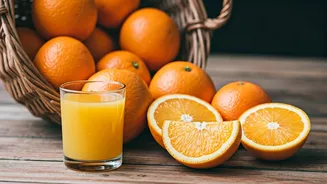Skin and Ageing
Vitamin C is essential for producing collagen, a protein that keeps skin firm and supple. A deficiency can lead to dull skin, sagging, and slow healing.
Topical Vitamin C serums are popular; however, dermatologists emphasize that dietary intake is vital for lasting results. Eating citrus fruits combined with Vitamin E-rich foods like nuts and seeds improves antioxidant protection. It is a powerful nutrient for skin health, and Vitamin C's role goes beyond just improving the look of skin; it is also an important part of the body’s aging process. Severe deficiencies can result in scurvy, although it is now rare, while even mild deficiencies can accelerate aging and weaken immunity over time. Focusing on a diet rich in Vitamin C, like amla, guava, and colourful fruits, can provide the body with essential nutrients to maintain healthy skin and slow down the aging process.
Immunity and Health
Vitamin C plays a critical role in supporting the immune system. Although Vitamin C may not prevent the common cold for most people, regular intake can shorten the duration and reduce the severity, especially for individuals under physical stress, such as athletes or shift workers. Vitamin C requirements can vary: The World Health Organization (WHO) suggests an intake of 75–90 mg daily for adults. Women should consume roughly 75 mg daily, while men need approximately 90 mg. Pregnant individuals should aim for 85 mg daily, and breastfeeding individuals should consume 120 mg. Children require less, and the recommended intake varies depending on age. Smokers, who lose Vitamin C faster, require around 35 mg more daily. The antioxidant properties of Vitamin C also help protect against heart problems and may reduce the risk of artery blockages. Thus, Vitamin C intake is not just important for short-term health benefits, such as preventing colds, but also has long-term effects on heart health.
Food vs Supplements
Most experts recommend obtaining Vitamin C through whole foods over supplements. Natural sources also provide fibre and phytonutrients, enhancing absorption. Eating various colourful fruits and vegetables daily ensures a steady supply of Vitamin C. Several foods have high concentrations of Vitamin C. For example, guava provides 228 mg per 100g, while amla provides 600 mg. Other foods, such as lemon (53 mg), orange (61 mg), red capsicum (120 mg), kiwi (92 mg), and papaya (60 mg), are also rich in this nutrient. High-dose supplements (above 1,000 mg/day) offer little additional benefit and may cause stomach discomfort. By focusing on a diet rich in whole foods, individuals can efficiently meet their daily Vitamin C requirements. This approach ensures optimal absorption and provides a range of other health benefits, beyond just Vitamin C intake.













